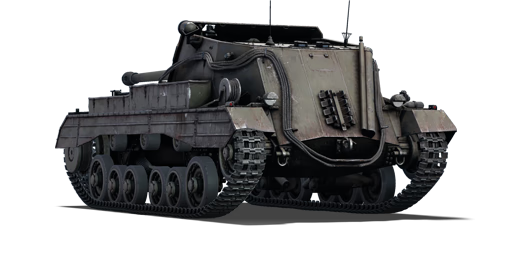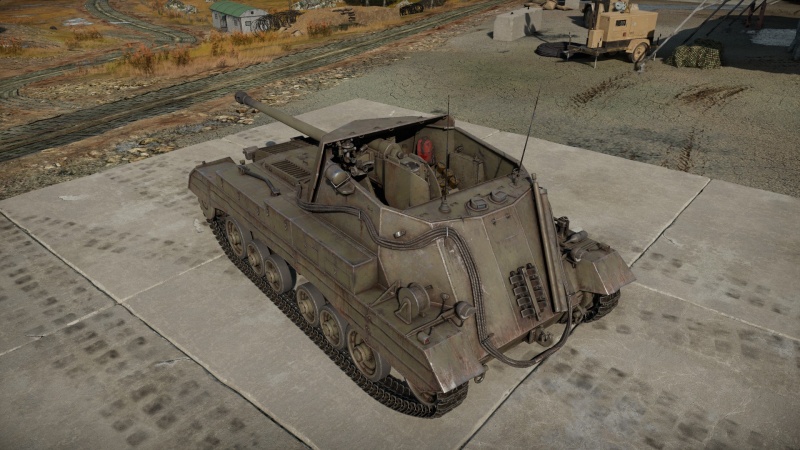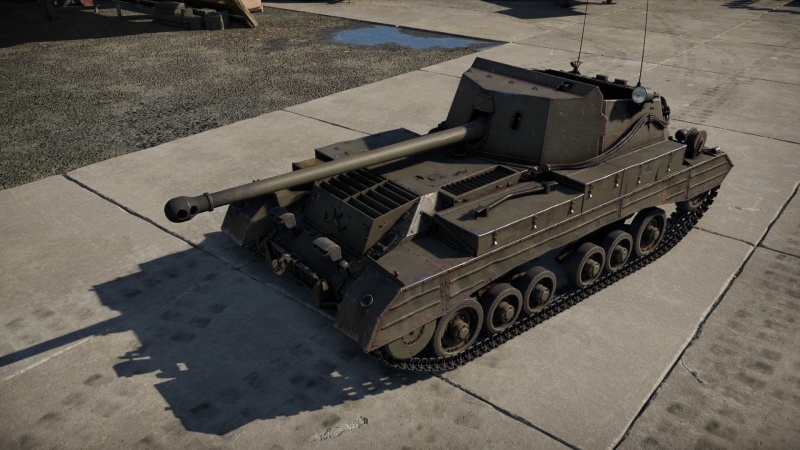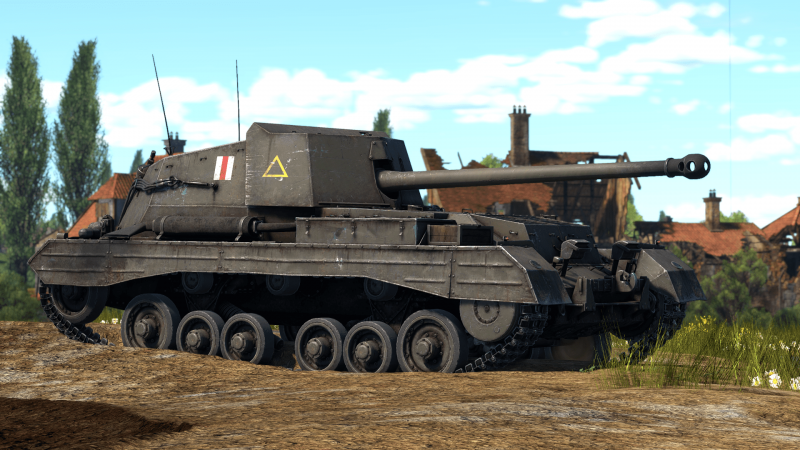Difference between revisions of "Archer"
(→Ammunition: Converted to transclusion) |
m |
||
| (9 intermediate revisions by 5 users not shown) | |||
| Line 6: | Line 6: | ||
== Description == | == Description == | ||
<!-- ''In the description, the first part should be about the history of the creation and combat usage of the vehicle, as well as its key features. In the second part, tell the reader about the ground vehicle in the game. Insert a screenshot of the vehicle, so that if the novice player does not remember the vehicle by name, he will immediately understand what kind of vehicle the article is talking about.'' --> | <!-- ''In the description, the first part should be about the history of the creation and combat usage of the vehicle, as well as its key features. In the second part, tell the reader about the ground vehicle in the game. Insert a screenshot of the vehicle, so that if the novice player does not remember the vehicle by name, he will immediately understand what kind of vehicle the article is talking about.'' --> | ||
| − | The ' | + | The introduction of the 17-pounder anti-tank gun into British service gave the British forces firepower capable of destroying the heavier German tanks; however, the gun's heavyweight and bulkiness presented a mobility issue for the crew. A Valentine chassis was chosen to be modified in order to fit the new gun. The modified Valentine, known as the '''Self Propelled 17pdr, Valentine, Mk.I, Archer''', was given a more powerful engine and a casemate superstructure on the front. The most distinctive feature of the Archer compared to any other tank destroyers in the war was that its gun is not facing forward, rather to the rear. This is because it is impossible to mount such a large gun relative to the hull without overloading the frontal chassis. The Archer was used on the Italian front and in the European campaign against Germany. As a self-propelled gun, the Royal Artillery had authority over the tank destroyer just like other tank destroyers in British service. Reception to the Archer revealed that the crews favoured the Archer over the M10 Achilles due to the better tactics the Archer presented by shooting then speeding away before the enemy could discover them. |
| − | + | Introduced in [[Update 1.55 "Royal Armour"]] alongside the initial British ground tree, the Archer's armament is very good at this battle rating. The same cannon is even used on Rank III and IV tanks like the [[Sherman Firefly]] and the [[A.C.IV]]. Its reload speed is not bad, but there are faster firing cannons at this rank. However, the Archer can destroy many enemy tanks in one shot, and if it doesn't destroy them it will incapacitate them. If the enemy is not destroyed and they can shoot you, retreat and reload. Once reloaded, you can try to destroy the enemy tank, but if it's aiming in your direction you can try sneaking up on it. The Archer does not have a turret, but its gun can traverse further left and right than most non-turreted tank destroyers, including the [[StuG III F]] and [[SU-122]]. While these tank destroyers have a different battle rating, you may still encounter them. | |
== General info == | == General info == | ||
| Line 14: | Line 14: | ||
{{Specs-Tank-Armour}} | {{Specs-Tank-Armour}} | ||
<!-- ''Describe armour protection. Note the most well protected and key weak areas. Appreciate the layout of modules as well as the number and location of crew members. Is the level of armour protection sufficient, is the placement of modules helpful for survival in combat? If necessary use a visual template to indicate the most secure and weak zones of the armour.'' --> | <!-- ''Describe armour protection. Note the most well protected and key weak areas. Appreciate the layout of modules as well as the number and location of crew members. Is the level of armour protection sufficient, is the placement of modules helpful for survival in combat? If necessary use a visual template to indicate the most secure and weak zones of the armour.'' --> | ||
| + | |||
| + | The Archer's armour will not protect against close range fire, and the gun shield is especially vulnerable to fire from heavy machine guns and autocannons. When in a firing position, the engine block can work as extra protection. Generally speaking, don't expect to survive prolonged exchanges with enemy tanks. | ||
| + | |||
| + | When facing the Archer's gun, consider firing onto the right side of the gun shield, as that will eliminate the gunner and prevent the Archer from firing back. Avoid firing directly on the front of the vehicle, as you are unlikely to kill the crew in an efficient amount of time. Instead get shots on the side or concentrate fire on the gun compartment. | ||
'''Armour type:''' | '''Armour type:''' | ||
| Line 95: | Line 99: | ||
The Archer has an open top, so you will need to be careful about machine guns and artillery. Its faster forward speed can allow you to escape from planes who are attacking you. You should also note that the Archer is faster than all three Valentines. While it is based on a Valentine, its reverse speed is about double the reverse speed of a Valentine, and its forward speed is about 9 km/h faster. | The Archer has an open top, so you will need to be careful about machine guns and artillery. Its faster forward speed can allow you to escape from planes who are attacking you. You should also note that the Archer is faster than all three Valentines. While it is based on a Valentine, its reverse speed is about double the reverse speed of a Valentine, and its forward speed is about 9 km/h faster. | ||
| − | Whenever facing tanks of any battle rating and rank, always be on alert and always have a backup plan as most tanks may be able to knock out the Archer in one shot. Do not worry, always play safely and stay at a reasonable distance from the cap circle or in an area which can be a | + | Whenever facing tanks of any battle rating and rank, always be on alert and always have a backup plan as most tanks may be able to knock out the Archer in one shot. Do not worry, always play safely and stay at a reasonable distance from the cap circle or in an area which can be a choke point for the enemy team. Always make sure you are in an area where they have to face the tank from in the cannon's arc to always have a first shot opportunity and have the enemy back off from charging straight into the Archer's field of fire. If a plane or tank starts strafing the Archer, pull out and find a new location as that place is now compromised and a wary pilot or flanking enemy could put an end to the Archer's career. |
=== Pros and cons === | === Pros and cons === | ||
| Line 102: | Line 106: | ||
'''Pros:''' | '''Pros:''' | ||
| − | * Ability to move faster in the opposite direction of the gun | + | * Ability to move faster in the opposite direction of the gun allows for a quick retreat |
| − | * The | + | * The QF 17-pounder is amazing at causing damage and offers easy ballistic trajectory |
* The direction configuration can confuse or surprise enemies | * The direction configuration can confuse or surprise enemies | ||
| − | * Very stealthy when in | + | * Very stealthy when in hull-down position |
| − | * Engine | + | * Engine can double as armour: some shots will be absorbed, protecting the crew |
| − | * | + | * Smooth handling despite strange design |
| − | * Decent speed for a SPG, | + | * Decent speed for a SPG, allowing it to keep pace with teammates |
'''Cons:''' | '''Cons:''' | ||
| − | * | + | * Thin armour means that heavy machine gun fire will penetrate armour plates quite easily |
| − | * | + | * Open-topped vehicle; vulnerable to planes, HE shells, and artillery strikes |
* Vehicle immobilization can occur often | * Vehicle immobilization can occur often | ||
* Only travels about 4 km/h backwards, which makes it hard to move in the direction of your gun | * Only travels about 4 km/h backwards, which makes it hard to move in the direction of your gun | ||
| − | * Very slow cannon traverse speed and average reload speed | + | * The Archer has a long reload time for its BR |
| − | * Lightly-armoured tanks may | + | * Very slow cannon traverse speed and average reload speed; high crew training is critical for maximum effectiveness |
| − | * | + | * Lightly-armoured tanks may get off easy from your shots, as the solid shots lack HE filler and produce little spalling |
| − | + | * It can be hard to master this vehicle as the gun does not face forward | |
== History == | == History == | ||
| Line 136: | Line 140: | ||
;Skins | ;Skins | ||
| + | |||
* [https://live.warthunder.com/feed/camouflages/?vehicle=uk_sp_17_pdr_valentine Skins and camouflages for the {{PAGENAME}} from live.warthunder.com.] | * [https://live.warthunder.com/feed/camouflages/?vehicle=uk_sp_17_pdr_valentine Skins and camouflages for the {{PAGENAME}} from live.warthunder.com.] | ||
Latest revision as of 12:30, 28 May 2024
Contents
Description
The introduction of the 17-pounder anti-tank gun into British service gave the British forces firepower capable of destroying the heavier German tanks; however, the gun's heavyweight and bulkiness presented a mobility issue for the crew. A Valentine chassis was chosen to be modified in order to fit the new gun. The modified Valentine, known as the Self Propelled 17pdr, Valentine, Mk.I, Archer, was given a more powerful engine and a casemate superstructure on the front. The most distinctive feature of the Archer compared to any other tank destroyers in the war was that its gun is not facing forward, rather to the rear. This is because it is impossible to mount such a large gun relative to the hull without overloading the frontal chassis. The Archer was used on the Italian front and in the European campaign against Germany. As a self-propelled gun, the Royal Artillery had authority over the tank destroyer just like other tank destroyers in British service. Reception to the Archer revealed that the crews favoured the Archer over the M10 Achilles due to the better tactics the Archer presented by shooting then speeding away before the enemy could discover them.
Introduced in Update 1.55 "Royal Armour" alongside the initial British ground tree, the Archer's armament is very good at this battle rating. The same cannon is even used on Rank III and IV tanks like the Sherman Firefly and the A.C.IV. Its reload speed is not bad, but there are faster firing cannons at this rank. However, the Archer can destroy many enemy tanks in one shot, and if it doesn't destroy them it will incapacitate them. If the enemy is not destroyed and they can shoot you, retreat and reload. Once reloaded, you can try to destroy the enemy tank, but if it's aiming in your direction you can try sneaking up on it. The Archer does not have a turret, but its gun can traverse further left and right than most non-turreted tank destroyers, including the StuG III F and SU-122. While these tank destroyers have a different battle rating, you may still encounter them.
General info
Survivability and armour
The Archer's armour will not protect against close range fire, and the gun shield is especially vulnerable to fire from heavy machine guns and autocannons. When in a firing position, the engine block can work as extra protection. Generally speaking, don't expect to survive prolonged exchanges with enemy tanks.
When facing the Archer's gun, consider firing onto the right side of the gun shield, as that will eliminate the gunner and prevent the Archer from firing back. Avoid firing directly on the front of the vehicle, as you are unlikely to kill the crew in an efficient amount of time. Instead get shots on the side or concentrate fire on the gun compartment.
Armour type:
- Rolled homogeneous armour
| Armour | Front | Sides | Rear | Roof |
|---|---|---|---|---|
| Hull | 20 mm (32-33°) Front glacis 20 mm (27°) Lower glacis |
20 mm | 20 mm (23°), 14 mm (60°) Top 20 mm (0°), 14 mm (65°) Bottom |
10 mm |
| Superstructure | 20 mm (32-33°) Same as hull front | 20 mm (13-18°) | 20 mm (16-57°) Gun shield 100 mm Gun breech |
N/A |
Notes:
- The front of the vehicle is the direction the driver is facing.
- Suspension wheels, bogies, and tracks are 20 mm thick.
- Belly armour is 10 mm thick.
- A 9-12 mm RHA plate separate the crew compartment from the engine
Mobility
| Game Mode | Max Speed (km/h) | Weight (tons) | Engine power (horsepower) | Power-to-weight ratio (hp/ton) | |||
|---|---|---|---|---|---|---|---|
| Forward | Reverse | Stock | Upgraded | Stock | Upgraded | ||
| Arcade | 36 | 5 | 16.3 | 273 | 366 | 16.75 | 22.45 |
| Realistic | 33 | 5 | 170 | 192 | 10.43 | 11.78 | |
Modifications and economy
Armaments
Main armament
| 76 mm QF 17-pounder | Turret rotation speed (°/s) | Reloading rate (seconds) | |||||||||||
|---|---|---|---|---|---|---|---|---|---|---|---|---|---|
| Mode | Capacity | Vertical | Horizontal | Stabilizer | Stock | Upgraded | Full | Expert | Aced | Stock | Full | Expert | Aced |
| Arcade | 39 | -7°/+15° | ±22° | N/A | 2.2 | 3.0 | 3.7 | 4.1 | 4.4 | 6.11 | 5.41 | 4.98 | 4.70 |
| Realistic | 1.5 | 1.7 | 2.1 | 2.4 | 2.5 | ||||||||
Ammunition
| Penetration statistics | |||||||
|---|---|---|---|---|---|---|---|
| Ammunition | Type of warhead |
Penetration @ 0° Angle of Attack (mm) | |||||
| 10 m | 100 m | 500 m | 1,000 m | 1,500 m | 2,000 m | ||
| Shot Mk.6 | AP | 171 | 168 | 155 | 139 | 126 | 113 |
| Shell Mk.1 | HE | 20 | 20 | 18 | 16 | 15 | 13 |
| Shot Mk.4 | APC | 171 | 168 | 155 | 139 | 126 | 113 |
| Shot Mk.8 | APCBC | 190 | 187 | 172 | 155 | 140 | 126 |
| Shell details | ||||||||||||
|---|---|---|---|---|---|---|---|---|---|---|---|---|
| Ammunition | Type of warhead |
Velocity (m/s) |
Projectile mass (kg) |
Fuse delay (m) |
Fuse sensitivity (mm) |
Explosive mass (TNT equivalent) (g) |
Ricochet | |||||
| 0% | 50% | 100% | ||||||||||
| Shot Mk.6 | AP | 883 | 7.71 | - | - | - | 47° | 60° | 65° | |||
| Shell Mk.1 | HE | 883 | 6.98 | 0.2 | 0.1 | 580 | 79° | 80° | 81° | |||
| Shot Mk.4 | APC | 883 | 7.71 | - | - | - | 48° | 63° | 71° | |||
| Shot Mk.8 | APCBC | 883 | 7.71 | - | - | - | 48° | 63° | 71° | |||
| Smoke shell characteristics | ||||||
|---|---|---|---|---|---|---|
| Ammunition | Velocity (m/s) |
Projectile mass (kg) |
Screen radius (m) |
Screen deploy time (s) |
Screen hold time (s) |
Explosive mass (TNT equivalent) (g) |
| 17pdr Shell SS Mk.1 | 229 | 8.44 | 13 | 5 | 20 | 50 |
Ammo racks
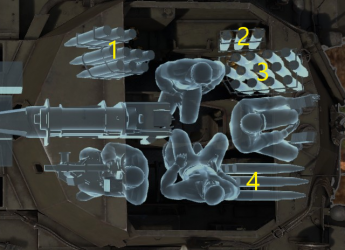
| Full ammo |
1st rack empty |
2nd rack empty |
3rd rack empty |
4th rack empty |
Visual discrepancy |
|---|---|---|---|---|---|
| 39 | 30 (+9) | 27 (+12) | 14 (+25) | 1 (+38) | No |
Note:
- Racks disappear after you've fired all shells in the rack.
Usage in battles
You should use the true forward direction (opposite of the gun) to travel from place to place as its reverse speed is low. You should travel in the direction of the gun when approaching an enemy or an area with combat taking place. Once you can shoot the enemy, fire around at them and quickly go in the true forward direction to retreat. The same applies to when you're sniping, fire a shot and retreat. Again, the Archer can be played in both close combat and sniping, but be sure not to get too close.
The Archer has an open top, so you will need to be careful about machine guns and artillery. Its faster forward speed can allow you to escape from planes who are attacking you. You should also note that the Archer is faster than all three Valentines. While it is based on a Valentine, its reverse speed is about double the reverse speed of a Valentine, and its forward speed is about 9 km/h faster.
Whenever facing tanks of any battle rating and rank, always be on alert and always have a backup plan as most tanks may be able to knock out the Archer in one shot. Do not worry, always play safely and stay at a reasonable distance from the cap circle or in an area which can be a choke point for the enemy team. Always make sure you are in an area where they have to face the tank from in the cannon's arc to always have a first shot opportunity and have the enemy back off from charging straight into the Archer's field of fire. If a plane or tank starts strafing the Archer, pull out and find a new location as that place is now compromised and a wary pilot or flanking enemy could put an end to the Archer's career.
Pros and cons
Pros:
- Ability to move faster in the opposite direction of the gun allows for a quick retreat
- The QF 17-pounder is amazing at causing damage and offers easy ballistic trajectory
- The direction configuration can confuse or surprise enemies
- Very stealthy when in hull-down position
- Engine can double as armour: some shots will be absorbed, protecting the crew
- Smooth handling despite strange design
- Decent speed for a SPG, allowing it to keep pace with teammates
Cons:
- Thin armour means that heavy machine gun fire will penetrate armour plates quite easily
- Open-topped vehicle; vulnerable to planes, HE shells, and artillery strikes
- Vehicle immobilization can occur often
- Only travels about 4 km/h backwards, which makes it hard to move in the direction of your gun
- The Archer has a long reload time for its BR
- Very slow cannon traverse speed and average reload speed; high crew training is critical for maximum effectiveness
- Lightly-armoured tanks may get off easy from your shots, as the solid shots lack HE filler and produce little spalling
- It can be hard to master this vehicle as the gun does not face forward
History
Development
The production of the 17-pounder anti-tank gun for British service gave the British military firepower capable of destroying the heavier German tanks, however, the gun's heavyweight and bulkiness presented a mobility issue for the crew. An attempt to make a mobile version was done in 1942, first with the Gun Carrier (3-in) as a self-propelled mount, then with the M10 tank destroyer from the Americans which proved more successful. Another project done was to use obsolete tank chassis and convert them into mounts for use, like the Crusader cruiser tanks and the Valentine infantry gun. The Valentine was chosen for further development as it was one of the more reliable tanks in British service and had the specifications needed to mount the gun. The modified Valentine, known as the Self Propelled 17pdr, Valentine, Mk.I, Archer, was given a more powerful engine and a casemate superstructure on the front. The most distinctive feature of the Archer compared to any other tank destroyers in the war was that its gun is not facing forward, rather to the rear. This had a benefit of reducing the vehicle's length by making the gun stretch out over the rear hull of the vehicle, limiting the gun from extending over the vehicle. The rear gun mounting, despite its unorthodox method, allowed the Archer to become an excellent ambush weapon, by firing at targets with its gun and able to speed away forward at full speed rather than the reverse. The first prototype of the Archer was made in 1943, trials were carried out in April 1943, which concluded favourably and 800 were ordered from Vickers and accepted into service in October 1944. Vickers were able to complete 655 Archer tank destroyers from March 1943 to until the end of the war in May 1945.
Combat usage
The Archer was used in the Italian front and the European campaign against Germany. As a self-propelled gun, the Royal Artillery had authority over the tank destroyer just like other tank destroyers in British service. Reception to the Archer proved that the crews favour the Archer over the M10 Achilles due to the better tactics the Archer presented by shooting then speeding away before the enemy could discover them. Though the drawbacks of the crew positions, open-topped superstructure, and limited gun traverse limited the Archer's capabilities, this was mitigated by its role as a tank destroyer and was used in World War II until the end.
Britain continued to use the Archer up until the 1950s. Once retired, some were sold to the Egyptian Army, to which they reported using it during the Suez Canal crisis in 1956. After that, no further action reports are known with the Archers.
Media
- Skins
- Videos
See also
- Vehicles equipped with the same chassis
External links
- [Wikipedia] Archer (tank destroyer)
- [Tanks Encyclopedia] Archer, Self Propelled 17 Pdr Anti-tank gun
| Vickers-Armstrongs Limited | |
|---|---|
| Ships | |
| Tribal-class | HMS Eskimo · HMCS Haida |
| Invincible-class | HMS Invincible* |
| Kongō-class | IJN Kongo** |
| Tanks | |
| Light Tanks | VFM5*** · Vickers Mk.11*** |
| Light Tank Mk VI | Light AA Mk I |
| Light Tank Mk VII | Tetrarch I |
| Light Tank Mk VIII | Alecto I |
| Tank, Infantry, Valentine | Valentine I · Valentine IX · Valentine XI · Archer |
| Vickers MBT | Vickers Mk.1 · Vickers Mk.3 · Vickers Mk.7*** |
| Heavy Tanks | Independent**** |
| Export | ▂МК-IX "Valentine" · Vickers Mk.E**** |
| See also | Vickers-Armstrongs Aircraft Limited |
| *Previously Armstrong Whitworth | |
| **Built for Japan | |
| ***Vickers Defence Systems | |
| ****Previously Vickers Limited | |
| Britain tank destroyers | |
|---|---|
| Infantry tank derivatives | Archer · Gun Carrier (3-in) |
| Light tank derivatives | Alecto I |
| M10 Achilles | Achilles · Achilles (65 Rg.) |
| Centurion derivatives | FV4005 · Conway |
| ATGM | Swingfire · Striker |
| Other | Tortoise · ▄M109A1 |
| Canada | QF 3.7 Ram |
| South Africa | G6 · ZT3A2 |


